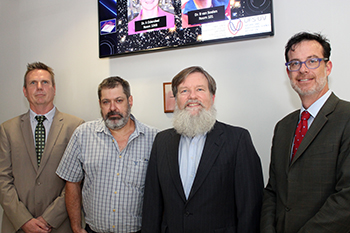Latest News Archive
Please select Category, Year, and then Month to display items
03 October 2018
|
Story UFS
|
Photo Katlego Sekele
 Students engaged authorities and Student Affairs
representatives on sexual and gender-based matters.
Students engaged authorities and Student Affairs
representatives on sexual and gender-based matters.
Do you know enough about the Sexual Harassment, Sexual Misconduct and Sexual Violence policy adopted by the university in June 2018? The Office for Gender and Sexual Equity (GSE) at the University of the Free State (UFS) hosted a dialogue on the role of the institution in matters of sexual and gender-based violence and addressing issues surrounding sexual violations.
Developments such as the countrywide #TotalShutdown: Intersectional Women’s March Against Gender-based Violence last month serve as proof of the dire need for issues surrounding sexual violations to inform policies and active safety measures.
Policy purpose
According to the policy, the objectives are to create a safe and enabling environment, establish a common understanding of what constitutes sexual harassment, sexual misconduct and sexual violence, provide applicable and accurate information, ensure that victims receive the necessary support, clearly outline disciplinary procedures for perpetrators, and clarify institutional accountability.
Student’s take on solutions
Tammy Fray, a member of the Student Representative Council, who formed part of the panel at the discussion, says the policy is not a one-stop-shop solution. “The policy is a guiding document. We have to then use it to inform activist work. We cannot always put the onus on policies and codes of conducts to solve problems. However it is our responsibility within this academic space to come up with solutions that enhance the way the policy works.”
Be informed about the policy
It is important to understand the stipulations of the policy in order to make full use of it. Geraldine Lengau, Officer at the GSE said: “It’s important that students know that the institution is not operating in silos but that their demands have been heard and the institution has acknowledged that there is a need for the policy to be adopted. It also makes the process of reporting better with the assistance of the Sexual Assault Response Team coordinator.”
NASA Deep Space Navigation engineer presents at Naval Hill Planetarium
2017-03-30

From the left: Chris du Plessis; US Consulate, Johannesburg,
Prof Petrus Meintjes; Dept of Physics UFS, Christopher Jacobs;
NASA, and Anthony Deaton; US Consulate Johannesburg.
Photo: Rulanzen Martin
The University of the Free State (UFS) hosted NASA Deep Space engineer Christopher Jacobs on 27 March 2017 at the Bloemfontein Campus. The engagement was hosted by Prof Matie Hoffman of the Department of Physics and the Department of Institutional Advancement, in collaboration with the US Consulate General in Johannesburg.
Jacobs is stationed at NASA’s Jet Propulsion Laboratory (JPL) at the California Institute of Technology and has served as the Reference Frame Calibration task manager for 25 years. In this role he has been responsible for delivering the reference frames used to navigate NASA missions such as the Mars Science Laboratory to planetary targets.
His visit to the UFS included a presentation to the Department of Astrophysics at the Faculty of Natural and Agricultural Sciences and at the Naval Hill Planetarium in Bloemfontein where he spoke on Stellar GPS: Navigating the Solar System. He also spoke about the latest research and developments at NASA in Astrometry. The visit will establish and develop shared interests and possible collaboration with UFS and other institutions of interest in the country. “South Africa, because of its well-placed geographic location in the southern hemisphere, holds a lot of answers to astronomy,” Jacobs said.
He has an active interest in professional and public education, and outreach, having given public lectures around the world. “Astronomy brings people together and is a point of common interest that is key in solving environmental and geographical challenges such as climate change, therefore global cooperation is important,” he said.
Prof Hoffman welcomed the initiative by the US Consulate and the possible outcomes of joint efforts to position the UFS as a key partner in South Africa on NASA’s astronomy projects. In the coming weeks Jacobs will speak at high schools in Gauteng including the Mae Jemison US Science Reading Room in Mamelodi, Pretoria, a centre that is focused on promoting science education.